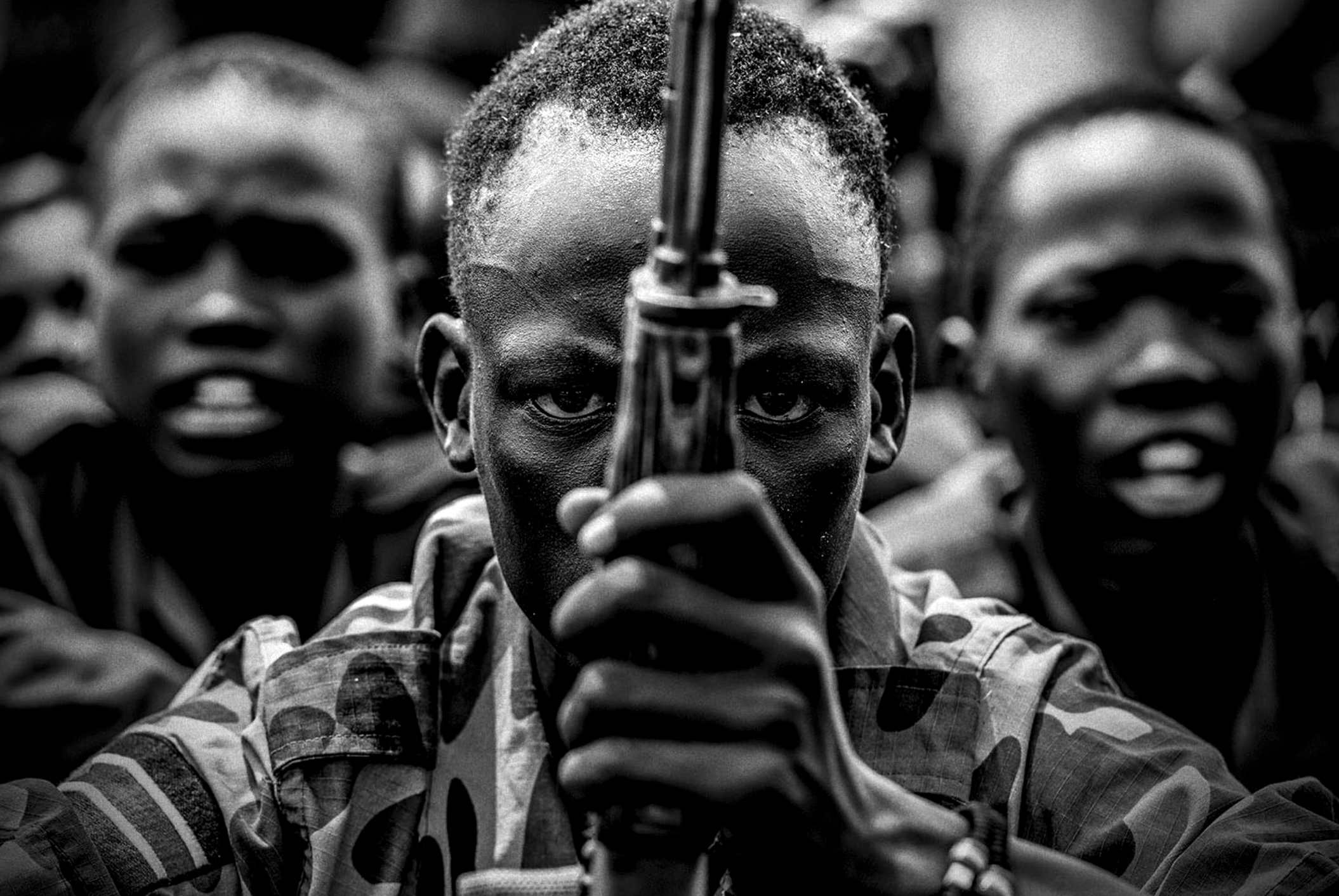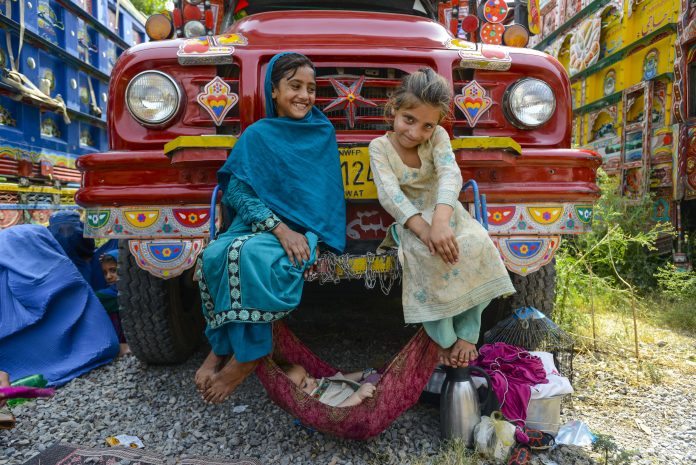With last year’s Nobel Prizes in literature and peace, the Nobel Committee made a significant statement on refugees and the importance of press freedom. Abdul Razak was awarded the Nobel Prize in Literature for depicting the “fate of the refugee in the gulf between cultures and continents.” Journalists Maria Ressa and Dimitri Muratov received the Nobel Peace Prize for their efforts to safeguard freedom of expression, which helps to ensure an informed public. These rights are “crucial prerequisites for democracy and protect against war and conflict.”
Through his work, Sebastian Rich has been doing both. He documents the lives of refugees worldwide, informing the public without any agenda. Global Strat View sat down for a virtual conversation with Rich, the self-described “photographer of war and sometimes peace.”

In a world with a distorted perception of refugees, Rich’s work depicts their reality. In one of his photographs, he quotes a Syrian refugee, “We are the same as you. We just want our children to be happy.”
Rich, who has been to refugee camps worldwide, says that various governments have weaponized refugees for their own political gains. And recently, refugees have become a point of suspicion. He says he can’t think of anywhere where refugees are actually welcome. “I have a hashtag on Instagram that says #refugeeswelcome, and I put that on a post, and I thought, hang on a minute, where are refugees actually welcome? I mean, apart from UNHCR refugee camps, what government has its arms open to refugees? Sadly, I’ve seen in my career refugees being welcomed with open arms and given everything to help them to actually being let to drown in the English Channel because, you know, France doesn’t want them, England doesn’t want them. So that’s a really sad thing to witness that in the time frame I’ve been photographing and gathering content for organizations like UNHCR and UNICEF.”

We talk about our shared background, coming from families who were displaced and had to seek refuge and rebuild their lives. Nobody wants to leave their home, and even if they do, there’s a tiny little bit of hope that they’ll be able to go back, but in many cases, they are not able to.

Rich, whose maternal family is Burmese, comments he wouldn’t be here today if his mother, grandmother, and great-grandmother hadn’t been evacuated from Burma to England as refugees after the Japanese invaded Burma during the second world war. “Maybe that’s why I feel so strongly about the dignity of refugees. They don’t lose their dignity. We strip them of it. When I say we, I mean governments, we tend to try and try and make them a lesser being, a lesser human. Somehow, that kind of fits in with some sort of strange narrative.”

But their dignity is one of the few things they can carry with them when they’ve been uprooted from their homes. Rich says it’s too easy to show refugees living in desperation. “We all know being a refugee is desperate. It’s horrible, and it’s nasty. We don’t have to hammer home that point all the time. So I always say, especially to women, how do you want me to photograph you? And I always get the same reaction. The big smiles and they rush off to another corner of the tent and put on what little makeup they managed to salvage when they fled from their homes, the best scarf or whatever, and they come out with a smile, and it makes their day because no one’s ever asked them that before.” Rich gathers the concept of their journey to the refugee camp, but he also talks to them about themselves and their lives without trying to make them sad.

“I don’t know how many assignments I’ve had with refugees, but on every single assignment, I always think I’ve heard everything. And with every assignment, there’s always something I hear that tops it. Always, you know, and you’ve got to hold it together because the one thing you cannot do is cry in front of the refugee. You mustn’t do this because I go home, you know, to having everything. And they have to go back into that tent that’s probably leaking. There’s no toilet. There’s very little food, and they’ve only got the clothes they managed to get across the border in,” says Rich.

Since the war in Syria, when Rich first went to Zaatari Camp and Azarak camp in Jordan, he found himself interviewing not a farmer who never went to school, but a judge, a lawyer, a doctor, a psychiatrist, a policeman, and a policewoman. But even though that person may have been a judge in Damascus, somehow that is stripped away for them by giving them this handle’ refugee.’ And it doesn’t matter if you were a doctor or a judge. You are still treated with suspicion.

He has addressed that in his latest book, ‘Untold Stories’ which is a collaboration with the UNHCR in Cyprus. “We were finding refugees who were giving something back to the host community. There was a mathematician, a genetic scientist working with the Cypriot government, and a whole range of people working within the Cypriot community. This is the stuff that doesn’t get headlines. So we are trying to educate people that these refugees are like you and me. And secondly, do you know how lucky you are to have some of these people like this genetic scientist and this mathematician? You know, these are people who are really contributing to Cypriot society. So with UNHCR, we put this little book together just to try and make people realize that they’re human beings and they’ve got a lot to offer.”
As of now, there are 84 million refugees in the world, and half of those are children. Some of Rich’s most beautiful images are of children. “When I turn up, the big white man covered in tattoos, I’m like a circus act with the camera. So they follow me around everywhere. And you know, we laugh and play football, and sometimes I give them the camera.”

Rich shares a memory from a UN refugee camp in Maban county, South Sudan, “There was this little girl. She must have been about eight, and she was following me and looking intently at the butterfly tattoos on my arm. She kept saying the same thing repeatedly to me through the translator.” He asked the translator what she was saying, and he kept replying that it was nothing, just silly children’s things. “Finally, he translated, and it’s probably the sweetest thing I’ve ever heard in my life. He said she wants to take the butterflies off your arms and put them in her pocket because it’s so dirty in this refugee camp. She wants to keep the wings clean. I just stopped in my tracks and had to sit down because of the innocence of that. I was just devastated.”

He laughs as he says that tattoos have been associated with football hooligans or criminals, and a little bit still exists of that today, but in the world’s refugee camps, they have been the biggest plus ever.

Rich has been going to Afghanistan since the end of the Russian occupation, so he has seen hope, desperation, sadness, everything. “In the 20-odd years the coalition forces were in Afghanistan, girls and women had more or less a normal education, more modest, maybe slightly conservative, but more or less a good education.” He remembers the last time the Taliban was in power, and he was sitting down with a Taliban leader in a town called Taleqan in the northeastern part of Afghanistan. “I asked him, what is it with you guys and women? Why do you not want your wife and daughters to go to school and get an education? And he just looked me straight in the face and said, ‘Well, would you send your sheep, your dog, your horse, your donkey to school? I said no, and he said, ‘Well, what’s the difference?’ You can’t even have a conversation after that. What’s the point?”

Rich talks about meeting and spending time with the late Ahmad Shah Massoud over 20 years ago. “Massoud, the lion of the Panjshir. I met him just before he was assassinated. He was very charismatic. He was like, you know, he’s the Che Guevara of Afghanistan. Very charismatic, incredibly well-educated, fluent French, fluent English, fluent Pashto, fluent Dari, and just a charming man, but a very, very clever military tactician.” Rich says you felt a certain energy when you were with him, and you could see why people followed him. “After his assassination, I knew Afghanistan was just going to go to pieces, and it hurts because if he’d still been alive, Afghanistan would have been a better place. I believe strongly that the Taliban would never have had the power that they have now. He firmly believed that all women should be educated because they gave us life, and we need to pay them back.”

Through his work, Rich has drawn a lot of attention to the plight of child soldiers. “Kofi Annan said it best that he considers their existence our greatest failure.” One of child soldiers’ most significant problems is reintegration into their communities. “If you have a child, say, 12 years old, who has just had the power of life and death. This child may have killed his parents. He may have attacked his family members. One of the things that get overlooked, and this is where UNICEF does an outstanding job, is that it takes months to organize one of these child soldier releases.” They don’t immediately go back into the community. They go through intensive psychotherapy and are slowly integrated back into the community. “One of the biggest problems is that the child soldier may have done the most awful things, but now when he goes home, his mother says to tidy up your room and do your chores. And this is a kid who’s been doing the most awful things and has had the power of life and death. He’s actually listening to mum and dad again. The dynamics are very complicated,” says Rich.


Rich has covered climate change, including the recent floods in South Sudan, where people were lugging their belongings nearly 20 kilometers through waist-deep water. He has been going back to the same countries all the time, seeing the topography and the whole landscape change. “I don’t see how anyone can deny climate change. I’m going back to countries that once were deserts and are now kind of a bit muddy. I was recently in Unity State in South Sudan, where a whole population that has had nothing to do with lakes, water, or waterways is now building canoes. They’re having to teach themselves. And this is purely a result of climate change.”

Poonam Sharma
Poonam is a multi-media journalist, and Founder and Editor of Global Strat View. She was the Managing Editor of India America Today (IAT) for seven years, and launched its print edition in 2019 with IAT's Founder and Editor, the late Tejinder Singh.









